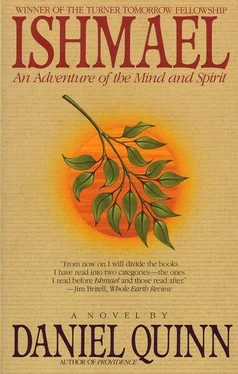“True. Let me see… How’s this: The world was made for man to conquer and rule, but his conquest turned out to be more destructive than was anticipated.”
“You’re not listening. The ‘but’ was part of the story long before your conquest became globally destructive. The ‘but’ was there to explain all the flaws in your paradise—warfare and brutality and poverty and injustice and corruption and tyranny. It’s still there today to explain famine and oppression and nuclear proliferation and pollution. It explained World War II, and if it ever has to, it will explain World War III.”
I looked at him blankly.
“This is a commonplace. Any third–grader could supply it.”
“I’m sure you’re right, but I don’t see it yet.”
“Come, think. What went wrong here? What has always gone wrong here? Under human rule, the world should have become a paradise, but…”
“But people screwed it up.”
“Of course. And why did they screw it up?”
“Why?”
“Did they screw it up because they didn’t want a paradise?”
“No. The way it’s seen is… they were bound to screw it up. They wanted to turn the world into a paradise, but, being human, they were bound to screw it up.”
“But why? Why, being human, were they bound to screw it up?”
“It’s because there’s something fundamentally wrong with humans. Something that definitely works against paradise. Something that makes people stupid and destructive and greedy and shortsighted.”
“Of course. Everyone in your culture knows this. Man was born to turn the world into a paradise, but tragically he was born flawed. And so his paradise has always been spoiled by stupidity, greed, destructiveness, and shortsightedness.”
“That’s right.”
Having second thoughts, I gave him a long incredulous stare. “Are you suggesting that this explanation is false ?”
Ishmael shook his head. “It’s pointless to argue with mythology. Once upon a time, the people of your culture believed that man’s home was the center of the universe. Man was the reason the universe had been created in the first place, so it made sense that his home should be its capital. The followers of Copernicus didn’t argue with this. They didn’t point at people and say, ‘You’re wrong.’ They pointed at the heavens and said, ‘Look at what’s actually there .’ ”
“I’m not sure what you’re getting at.”
“How did the Takers come to the conclusion that there’s something fundamentally wrong with humans? What evidence were they looking at?”
“I don’t know.”
“I think you’re being purposely dense. They were looking at the evidence of human history.”
“True.”
“And when did human history begin?”
“Well… three million years ago.”
Ishmael gave me a disgusted look. “Those three million years were only very recently tacked onto human history, as you very well know. Before that, it was universally assumed that human history began when?”
“Well, just a few thousand years ago.”
“Of course. In fact, among the people of your culture, it was assumed that the whole of human history was your history. No one had the slightest suspicion that human life extended beyond your reign.”
“That’s so.”
“So when the people of your culture concluded that there’s something fundamentally wrong with humans, what evidence were they looking at?”
“They were looking at the evidence of their own history.”
“Exactly. They were looking at a half of one percent of the evidence, taken from a single culture. Not a reasonable sample on which to base such a sweeping conclusion.”
“No.”
“There’s nothing fundamentally wrong with people. Given a story to enact that puts them in accord with the world, they will live in accord with the world. But given a story to enact that puts them at odds with the world, as yours does, they will live at odds with the world. Given a story to enact in which they are the lords of the world, they will act like lords of the world. And, given a story to enact in which the world is a foe to be conquered, they will conquer it like a foe, and one day, inevitably, their foe will lie bleeding to death at their feet, as the world is now.”
“A few days ago,” Ishmael said, “I described your explanation of how things came to be this way as a mosaic. What we’ve looked at so far is only the cartoon of the mosaic—the general outline of the picture. We’re not going to fill in the cartoon here. That’s something you can easily do for yourself when we’re finished.”
“Okay.”
“However, one major element of the cartoon remains to be sketched in before we go on…. One of the most striking features of Taker culture is its passionate and unwavering dependence on prophets. The influence of people like Moses, Gautama Buddha, Confucius, Jesus, and Muhammad in Taker history is simply enormous. I’m sure you’re aware of that.”
“Yes.”
“What makes it so striking is the fact that there is absolutely nothing like this among the Leavers—unless it occurs as a response to some devastating contact with Taker culture, as in the case of Wovoka and the Ghost Dance or John Frumm and the Cargo Cults of the South Pacific. Aside from these, there is no tradition whatever of prophets rising up among the Leavers to straighten out their lives and give them new sets of laws or principles to live by.”
“I was sort of vaguely aware of that. I suppose everyone is. I think it’s… I don’t know.”
“Go on.”
“I think the feeling is, what the hell, who cares about these people? I mean, it’s no great surprise that savages have no prophets. God didn’t really get interested in mankind until those nice white neolithic farmers came along.”
“Yes, that’s well perceived. But what I want to look at right now is not the absence of prophets among the Leavers but the enormous influence of prophets among the Takers. Millions have been willing to back their choice of prophet with their very lives. What makes them so important?”
“It’s a hell of a good question, but I don’t think I know the answer.”
“All right, try this. What were the prophets trying to accomplish here? What were they here to do?”
“You said it yourself a minute ago. They were here to straighten us out and tell us how we ought to live.”
“Vital information. Worth dying for, evidently.”
“Evidently.”
“But why? Why do you need prophets to tell you how you ought to live? Why do you need anyone to tell you how you ought to live?”
“Ah. Okay, I see what you’re getting at. We need prophets to tell us how we ought to live, because otherwise we wouldn’t know.”
“Of course. Questions about how people ought to live always end up becoming religious questions among the Takers—always end up being arguments among the prophets. For example, when abortion began to be legalized in this country, it was initially treated as a purely civil matter. But when people began to have second thoughts about it, they turned to their prophets, and it soon became a religious squabble, with both sides lining up clergy to back them. In the same way, the question of legalizing drugs like heroin and cocaine is now being debated in primarily practical terms—but if it ever becomes a serious possibility, people of a certain turn of mind will undoubtedly begin combing scriptures to see what their prophets have to say on the subject.”
“Yes, that’s so. This is such an automatic response that people just take it for granted.”
Читать дальше
Конец ознакомительного отрывка
Купить книгу












